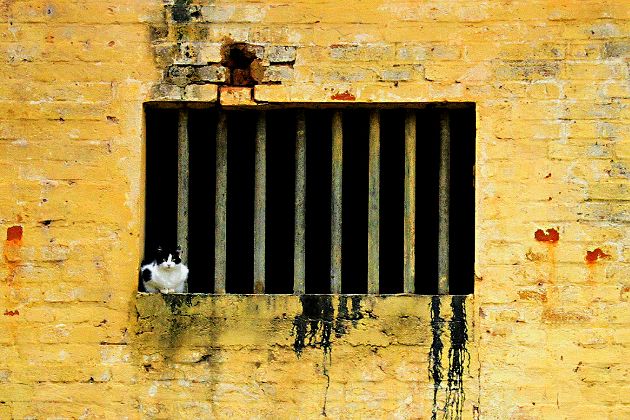28/09/2013

The arrest of Golden Dawn leader Nikos Michaloliakos, a handful of his MPs and several party members on Saturday was a surprise on many levels.
Firstly, no party leader has been arrested in Greece since the collapse of the military dictatorship in 1974. Then there is the issue of key institutions such as the police and judiciary working with great speed and efficiency. These are qualities they have not always displayed.
Also, the clampdown on the neo-fascist party - which has reportedly been linked to 10 murders and attempted murders, blackmail, money laundering and other crimes - overturns the apparent tolerance the government had shown towards Golden Dawn since its stunning election success last summer and subsequent rise in opinion polls
Finally, the government appears to have displayed a previously absent determination to address the influence and contacts Golden Dawn had within the police. Saturday’s arrests came in the wake of the resignation of two high-ranking police officers and the replacement or suspension of more than 10 others. A senior officer at the National Intelligence Service was also removed from his position.
The swiftness with which authorities have acted after a Golden Dawn member murdered anti-fascist rapper Pavlos Fyssas on September 17 has been impressive. The investigation, led by a Supreme Court prosecutor, has pooled together numerous cases involving Golden Dawn MPs and members. This has allowed him to build a case that they formed a criminal organization led by Michaloliakos. Prosecutors hope that with the help of wiretaps they will be able to prove that the neo-Nazi leader and core group of MPs directed a range of criminal activity.
Politically, much will rest on the judiciary being able to back up its charges. A failure to do so would have devastating consequences for the government and allow Golden Dawn to re-emerge fortified from the experience. If the charges stick, Prime Minister Antonis Samaras will have gone a long way to countering the criticism that he and his advisers allowed the ideological lines between New Democracy and Golden Dawn to become blurred in some areas, such as on the issue of immigration.
Opinion polls earlier this week indicated that New Democracy stands to benefit most from a Golden Dawn collapse, especially as roughly four in 10 of the Greek who voted for the neo-Nazi party last summer had previously backed the conservatives.
Nevertheless, Saturday’s events leave a number of issues open. First of all, Golden Dawn’s collapse is by no means certain. While the judiciary has the ability to dismantle much of the party machinery if it proves its case in court, there is no guarantee that the far right will not continue to have a strong representation in Greek politics. This will always be a possibility as long as Greece’s economy and society remain in the doldrums and its institutions lack transparency.
Furthermore, it is not clear what consequences the arrests will have for the functioning of Parliament. For the time being, Golden Dawn will continue to be represented as its MPs are allowed retain their role until convicted. Even in the case of them resigning en masse, national elections are not a foregone conclusion. A series of by-elections or the Supreme Court awarding the seats to the leading party (New Democracy) are also possibilities.
It is uncertain whether any party would benefit from calling national elections now. SYRIZA appears to be pushing for polls but is probably motivated by the concern that New Democracy might strengthen its position as time passes. PASOK has nothing to gain from elections now. Weakened and unable to establish a clear identity, it knows that the outcome of any vote would leave it playing a feeble second fiddle, if that, to New Democracy or SYRIZA in a coalition government.
For New Democracy and Samaras, though, there is much to ponder. Elections now could allow the conservatives to capitalise on public support for the Golden Dawn clampdown. There is a risk, though, that it could be seen as political opportunism at the expense of the country, whose economic future is still finely balanced. Samaras’s opponents could – once again – accuse him of double talk as he has spent the 15 months since his election preaching for the need to stabilise the country and accusing SYRIZA of undermining his efforts.
One other factor in Samaras’s decision will be the reaction from outside Greece. The successful prosecution of Golden Dawn would help win his government much-needed support within Europe and the USA, where he was due to travel on Saturday. The Europeans were disconcerted by Greece’s lax attitude towards Golden Dawn, especially in the build up to European Parliament elections in May, when far right and nationalist parties are expected to have a strong showing. By acting now, Samaras and his government can turn this negative sentiment around.
It could be the case that Samaras will prefer to cash in his political capital in Brussels and Washington by being the man who brought down Golden Dawn and did not call elections rather than making a short-term gain at home by going to the polls.
![The [Greek] European Tragedy](https://blogger.googleusercontent.com/img/b/R29vZ2xl/AVvXsEiWKI5s90SFm1wWTk6bs4p7CgslaC2SnYPsrZhb-B-smOufNNCSxCvpBLI9hOB-LsXZjir_PNmEiMk2-E62F3xkg96IoC6QFAaZAnPRTVH340IN9WBRmWJqPkjWlgyRj3zpALp7h6hvA58/s920/GkBack_new.jpg)